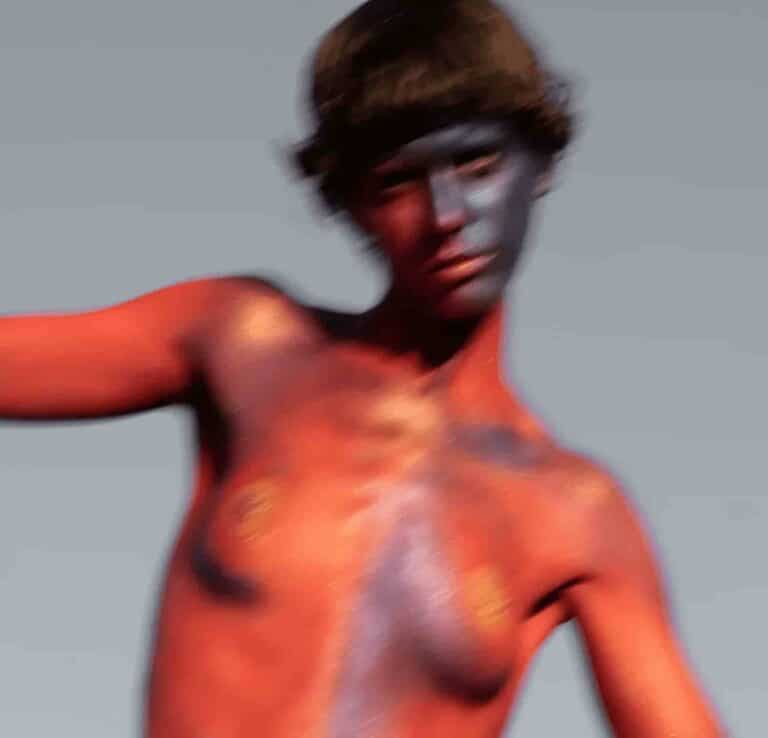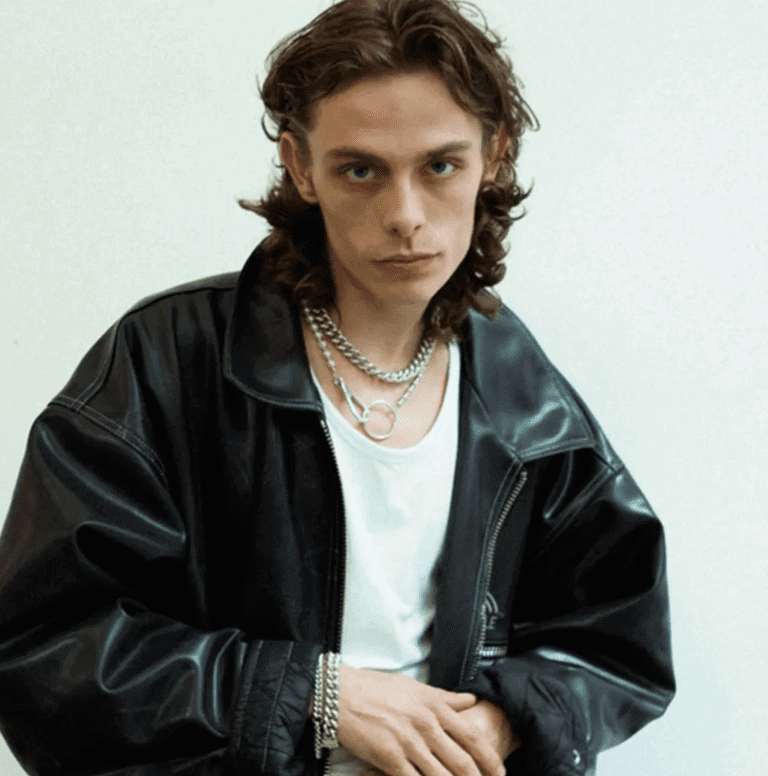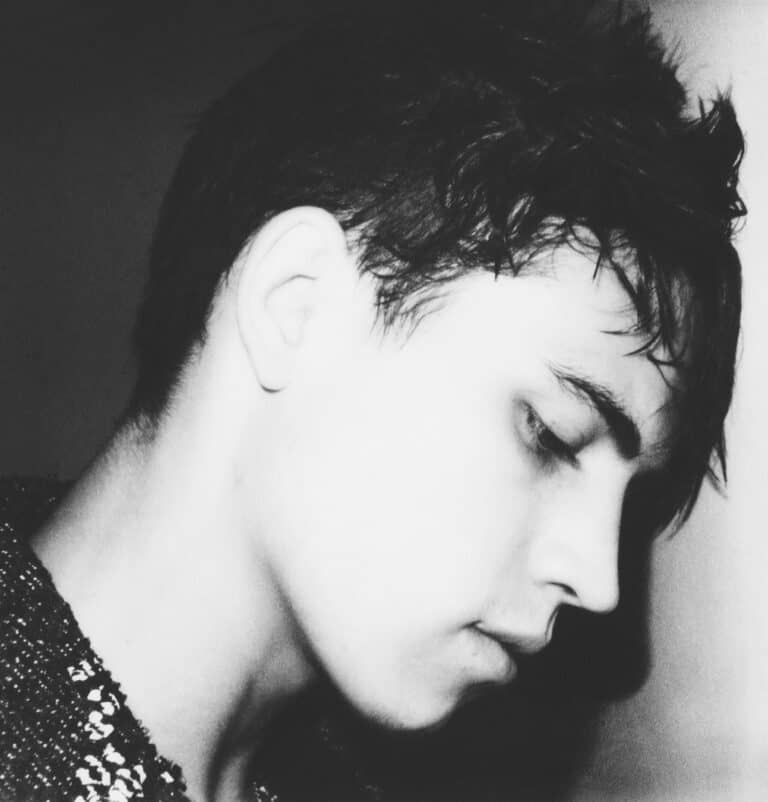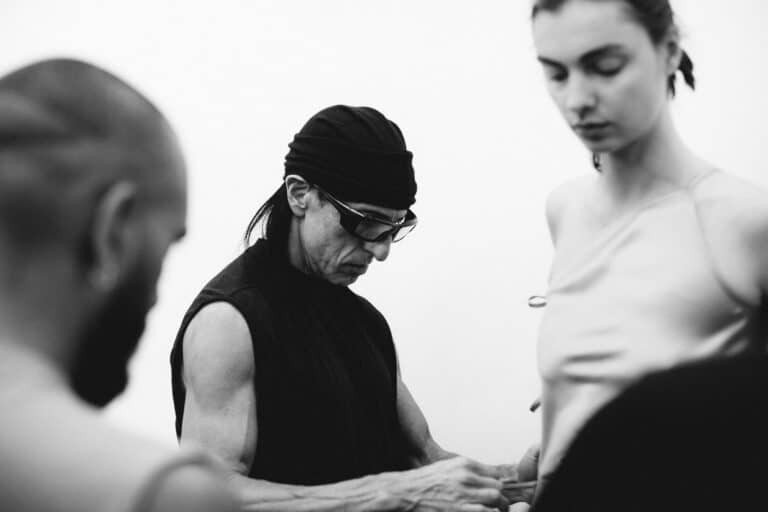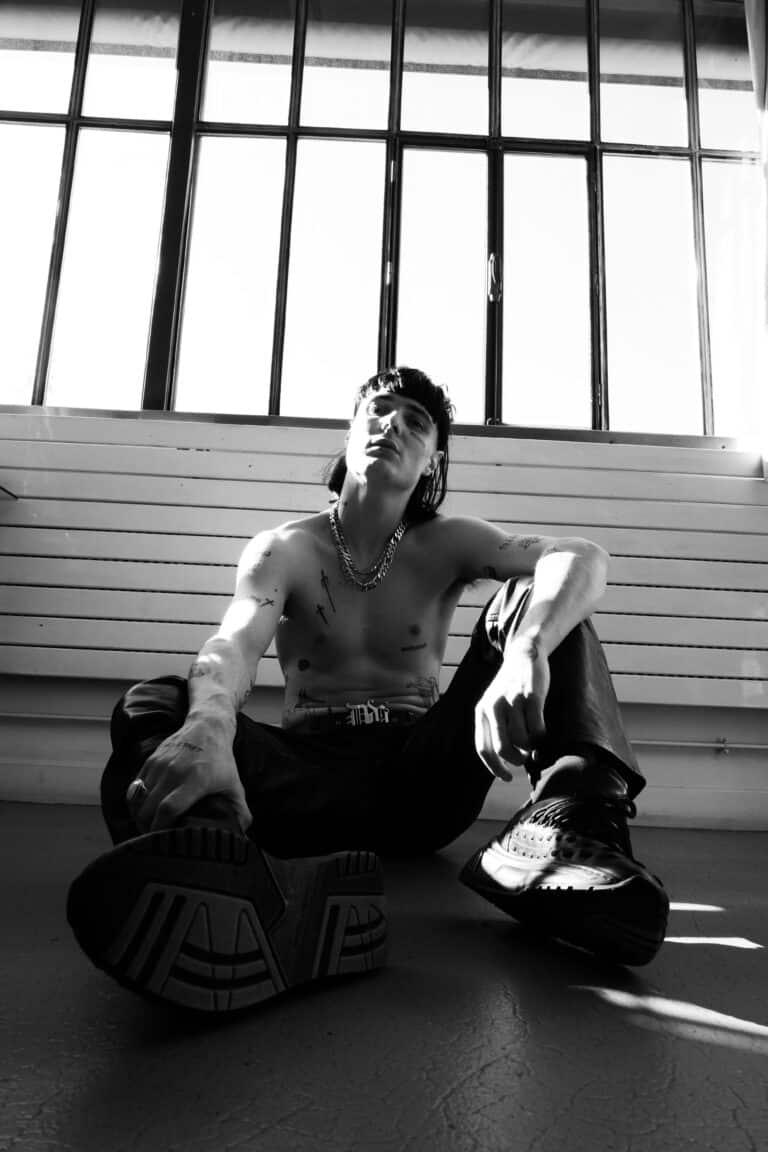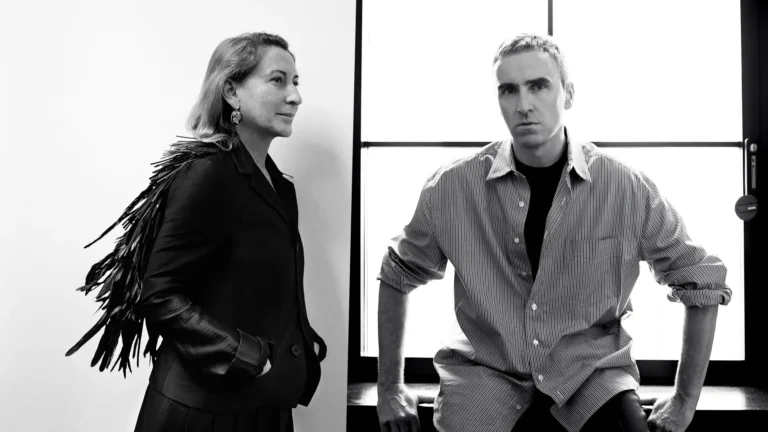Alpha Dia discusses his eponymous foundation set up to help children in Senegal
Read time 4 minutes
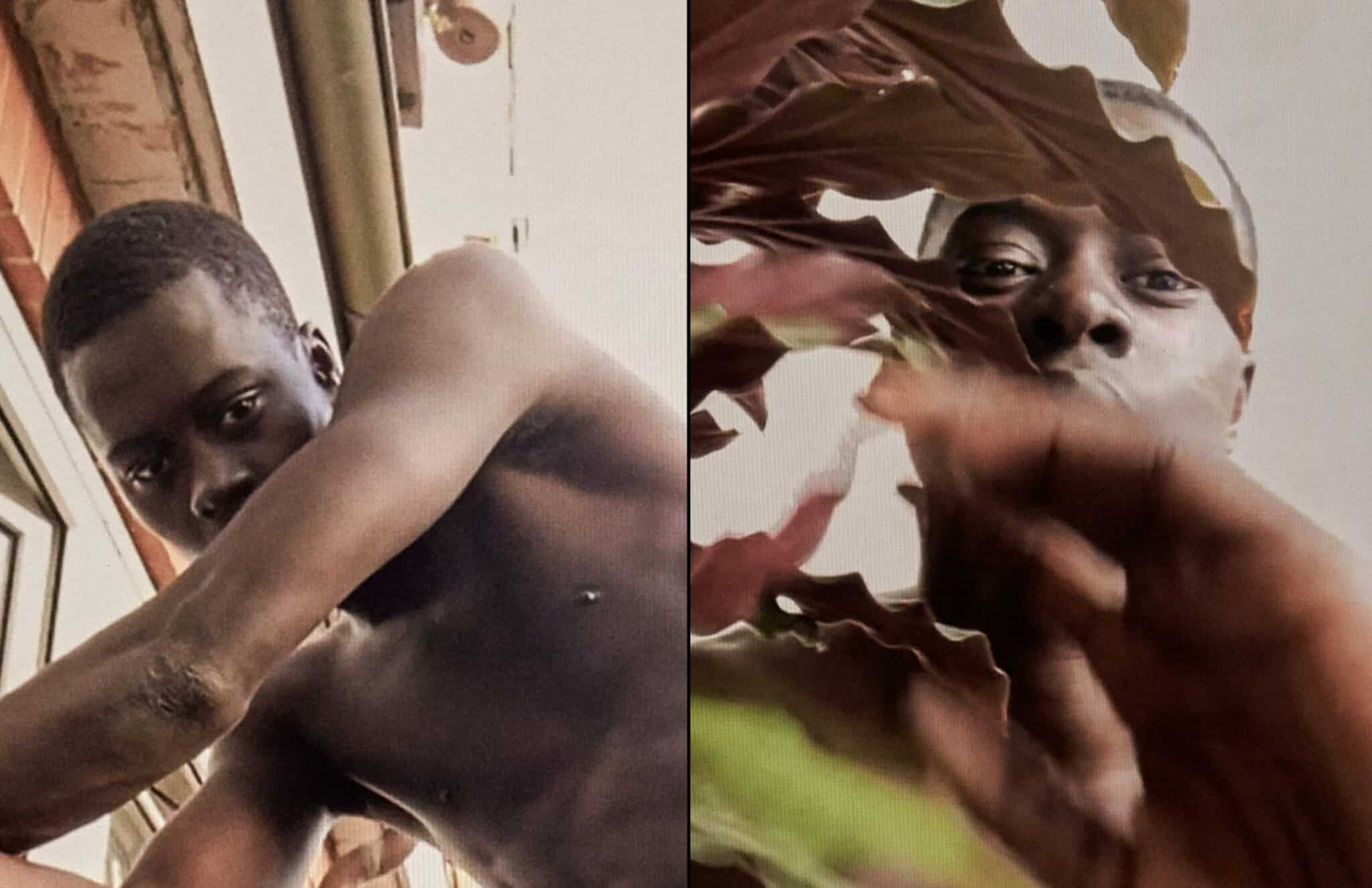
Photography by Benjo Arwas.
From Dakar to the global stage, Alpha Dia shines as a model and philanthropist. His story is one of breaking barriers, staying true to himself, and making a difference for his community.
Alpha Dia’s story is one of resilience, talent, and purpose. Born in Dakar, Senegal, in 1992, Dia grew up surrounded by a rich culture that would later inspire his global vision. His life took a transformative turn when he was scouted in a Hamburg bar by photographer Christian Bendel. Shortly after, Dia signed with Modelwerk agency, which catapulted him onto international runways. His debut with Prada during Milan Fashion Week marked the beginning of a career that would see him working with brands like BOSS, Givenchy, and Salvatore Ferragamo.
Dia’s rise in the modeling world is a testament to his character and determination. Nominated for Models.com’s Model of the Year: Men Award in 2019, he attributes his success to “a strong character and a great team.” His breakout year in 2020 included campaigns for Missoni and Boss and editorials in Numéro Berlin and V Man. As his career soared, Dia remained grounded, focusing not only on his craft but also on his mission to give back to his roots in Senegal.
Behind the glamour of international runways lies Dia’s unwavering commitment to social responsibility. Through the Alpha Dia Foundation, he aims to address pressing issues faced by families in Senegal, including nutritional challenges exacerbated by the pandemic. Dia believes that keeping children safe is a shared responsibility, and he works tirelessly to deliver quality services that yield positive results for communities. His foundation embodies the values he holds dear: generosity, family, and cultural pride.
As a model of color, Dia has faced challenges, including ignorance and racism. Growing up as an African in Europe shaped his perspective and heightened his sensitivity to these issues. Despite these obstacles, Dia remains steadfast in his pursuit of excellence, using his platform to encourage others to embrace their identity and heritage. His story is one of overcoming barriers while paving the way for future generations of black models to thrive in an industry often marred by exclusivity.
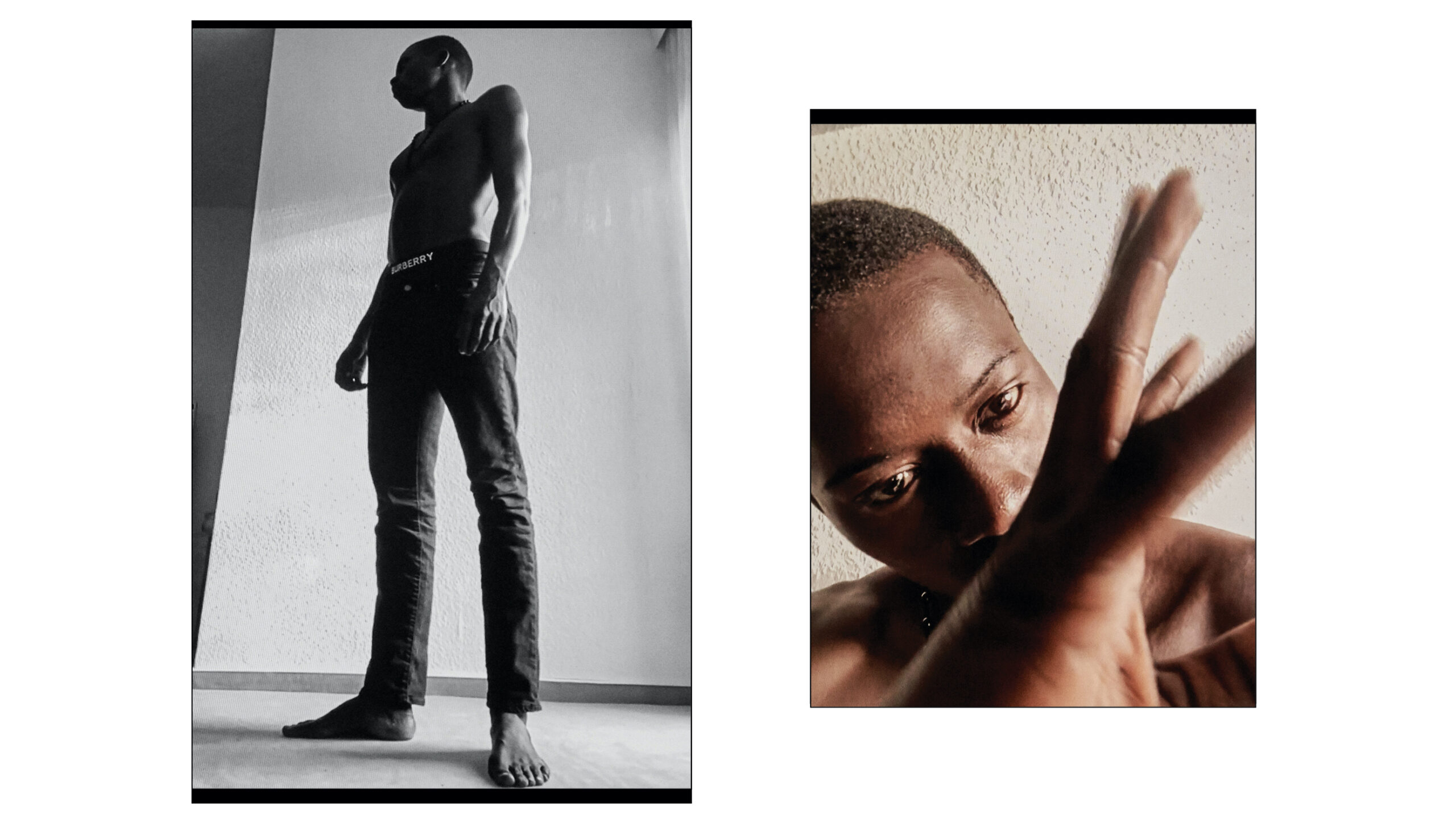
Photography by Benjo Arwas.
Slick: Alpha, let’s start with something fun to help our readers get to know you better. If you had to sum up who you are in just five words, what would those be? And why did you choose those specific words to define yourself?
Alpha: That’s an interesting way to start! I’d say Senegal, Africa, Family, Generosity, and Fun. Senegal because it’s where everything began for me. It’s not just my birthplace but also my anchor. Africa because it represents the richness of my culture and heritage, which I carry with pride everywhere I go. Family because they’re my foundation, my support system—they’ve shaped who I am today. Generosity is a value I try to live by, giving back to my community and helping others. And Fun, well, because life should have its joyful moments. Even when things get tough, I always try to find reasons to laugh and enjoy the journey.
Slick: You’ve been fortunate to travel the world as part of your career, experiencing so many different cultures and places. When the world feels open again for travel, what’s the first place you’d want to go, and why?
Alpha: For me, it’s always Senegal first. There’s something special about going home, being with family, eating traditional food, and reconnecting with the roots of who I am. It’s where I recharge. But I’d also love to book a job in a country I haven’t been to yet. It’s exciting to visit new places for work and learn from different cultures. Every destination teaches me something new and broadens my perspective.

Slick: Let’s talk about your career and the path you’ve taken. If modeling wasn’t part of your journey, what do you think you’d be doing today? Do you think you’d still be drawn to something creative or would you have explored an entirely different path?
Alpha: That’s something I think about sometimes, especially during quiet moments. If not modeling, I’d definitely still want to do something creative. Maybe photography or even architecture. I’m fascinated by design and the idea of creating something lasting and impactful. Modeling has shown me the power of visuals and storytelling, and I think I’d find a way to express that passion, no matter what.
Slick: Working from home has become the norm for so many people over the past few years. What does your work-from-home routine look like, and how do you stay productive when the structure of an office or studio isn’t there?
Alpha: It’s a mix of laid-back and disciplined. I usually keep it simple—joggers, a T-shirt, and lots of time on the couch. But I also make sure to stay active. I’ll play basketball or do quick workouts to keep my energy high. Staying focused at home can be a challenge, but setting small goals for the day helps me stay on track. Whether it’s reviewing materials for upcoming shoots or brainstorming for my foundation, I like to have a sense of accomplishment by the end of the day.
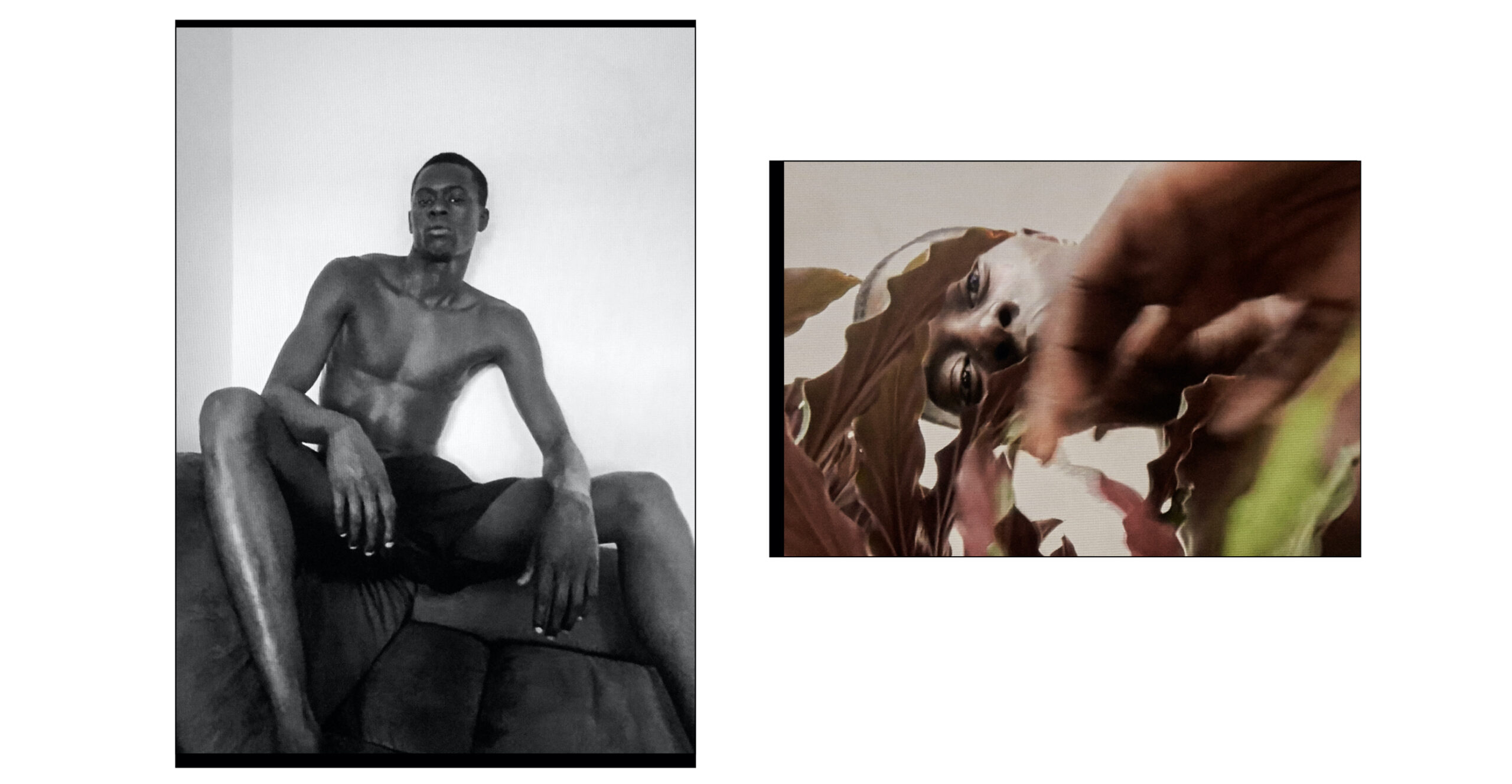
Photography by Benjo Arwas.
Slick: Speaking of your foundation, can you tell us more about the Alpha Dia Foundation? What inspired you to start it, and what are its main goals?
Alpha: Absolutely. The foundation is a personal mission for me, deeply tied to my upbringing in Senegal. Growing up, I saw firsthand how families struggled, especially when it came to basic needs like food and education. The foundation focuses on keeping children safe and addressing their nutritional and educational needs. The pandemic has made things even harder for many families, so we’ve been working to provide assistance where it’s most needed. It’s about creating sustainable change and offering hope to communities that need it most.
Slick: You’ve had so many memorable moments in your career, from major campaigns to walking iconic runways. Is there one experience that stands out to you as particularly exhilarating?
Alpha: Walking for L’Oréal on the Champs-Élysées in Paris was definitely one of those moments. The energy was electric, the crowd was huge, and I was sharing the stage with some incredible talents like Doutzen Kroes and Maria Borges. It wasn’t just about the fashion—it felt like a celebration of beauty and diversity. It was surreal, and the adrenaline rush is something I’ll never forget.
Slick: The modeling industry has made strides toward inclusivity, but there’s still work to be done. As a model of color, what challenges have you faced, and how have they shaped your journey?
Alpha: Growing up as an African in Europe, I faced a lot of ignorance and racism. People often made assumptions about me without really understanding my background. It was frustrating, but it also gave me a thicker skin and a stronger sense of purpose. I’ve used those experiences to push myself and show that we belong in this industry just as much as anyone else. It’s about breaking stereotypes and inspiring the next generation.

Photography by Benjo Arwas.
Slick: You’ve mentioned that your family is a major source of motivation for you. How do they influence the way you approach your work and life in general?
Alpha: My family is everything to me. No matter how far I go or how busy life gets, I know they’re always there for me. That kind of unconditional love gives me the strength to chase my dreams. It also keeps me grounded—success is sweeter when you have people to share it with, and my family reminds me of what truly matters.
Slick: Over the past couple of years, the world has changed a lot, and many people have gone through personal transformations. How would you say you’ve grown during this time?
Alpha: These past two years have been a period of immense growth for me, both spiritually and mentally. I’ve become more aware of my body, my health, and the importance of balance. I’ve learned to listen to myself more and focus on what truly brings me peace and fulfillment. It’s been a challenging time, but also a deeply rewarding one.
Slick: If you could go back in time and give your younger self one piece of advice, what would it be?
Alpha: I’d tell myself to stay true to who I am, no matter what. There will always be people who try to put you in a box or make you feel like you don’t belong. But your identity is your strength. Trust yourself, stay resilient, and never lose sight of your values. That’s what will carry you through.
Slick: What’s been the most rewarding part of your career so far?
Alpha: The most rewarding part has been the ability to inspire others. When someone tells me that my story or my work has motivated them to pursue their own dreams, it’s the best feeling. It reminds me that what I’m doing is bigger than me—it’s about creating a ripple effect of positivity and change.
Slick: If you could collaborate with any designer or creative in the fashion world, who would it be, and why?
Alpha: I would have loved to collaborate with Virgil Abloh. His work was groundbreaking—he redefined what it means to blend streetwear with high fashion and created opportunities for people of color in an industry that often overlooks us. His vision was bold and unapologetic, and working with someone like that would have been an honor.
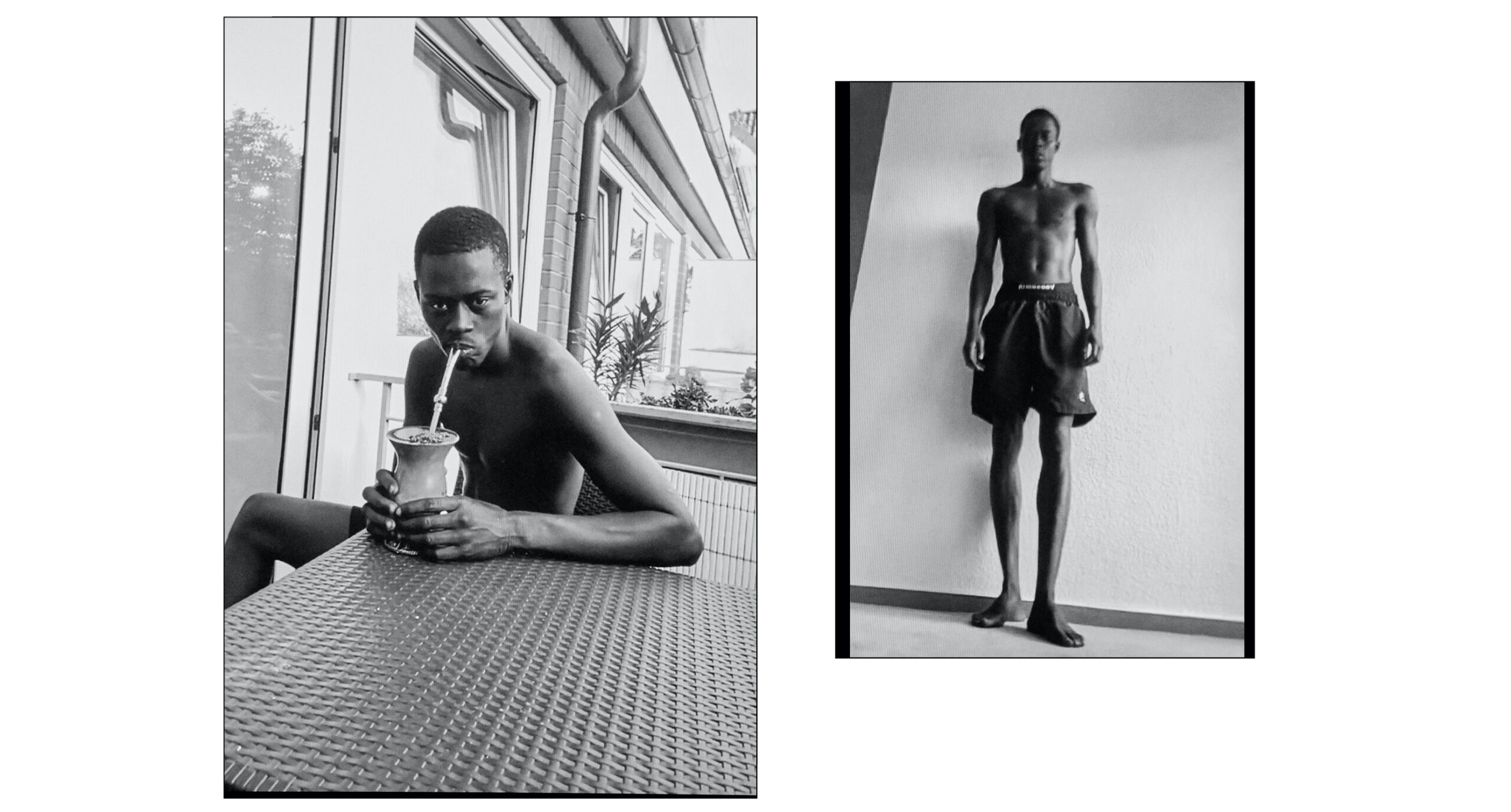
Photography by Benjo Arwas.
Slick: What’s one misconception about the modeling industry that you wish people understood?
Alpha: People often think modeling is all about looking good and showing up for photo shoots, but it’s so much more than that. It requires discipline, resilience, and constant growth. You’re not just selling clothes—you’re representing brands, telling stories, and connecting with audiences on an emotional level. It’s a craft, and it takes a lot of hard work.
Slick: What legacy do you hope to leave behind, both as a model and as a person?
Alpha: I want my legacy to be about more than just fashion. I hope to be remembered as someone who used his platform to make a positive impact, whether it’s through my foundation or inspiring young people to follow their dreams. I believe we all have the power to create change, and I want to do my part to make the world a better place.
Slick: Finally, what does success mean to you? Is it about personal achievements, or does it go beyond that?
Alpha: For me, success isn’t just about personal achievements. It’s about using what I’ve accomplished to help others achieve their goals. It’s about making a difference, no matter how small, and leaving the world a little better than I found it.
Alpha Dia’s journey from Dakar to international acclaim is a testament to the power of resilience, ambition, and purpose. Beyond his achievements on the runway, Dia’s story is one of giving back and inspiring change. Through his foundation, he addresses critical issues faced by families in Senegal, ensuring that his success translates into meaningful impact.
In the face of challenges, Dia has remained steadfast, using his platform to advocate for representation and inclusion. His experiences with racism have fueled his drive to create opportunities for others, ensuring that future generations of black models feel empowered to succeed. Dia’s work is a reflection of his belief in staying true to one’s identity and using influence for good.
Dia’s legacy is not only defined by his campaigns and editorials but also by the lives he touches through his philanthropic work. His efforts to uplift his community serve as a reminder of the importance of generosity and responsibility in positions of influence. By bridging the worlds of fashion and activism, Dia exemplifies how success can be a force for good.
As Alpha Dia continues to make strides in the fashion industry, his journey inspires others to dream big and remain connected to their roots. His story is a powerful example of how authenticity, perseverance, and purpose can transform not only an individual’s life but also the lives of many others. As Dia himself says, “Success is not just about what you achieve—it’s about what you inspire in others and the legacy you leave behind.” – Alpha Dia
Text by
Kaden Mason
Photography by
Benjo Arwas
Posted
July 5, 2019
Text by
Kaden Mason
Photography by
Benjo Arwas
August 9, 2018
Related
by admin
by Kelly Barnes
by Adrian Hendrix
by Kylar Ashton
Dissenting from reality: Meet Mua Sabu Suzuki and Photographer Mika Kailes
Read time 4 minutes
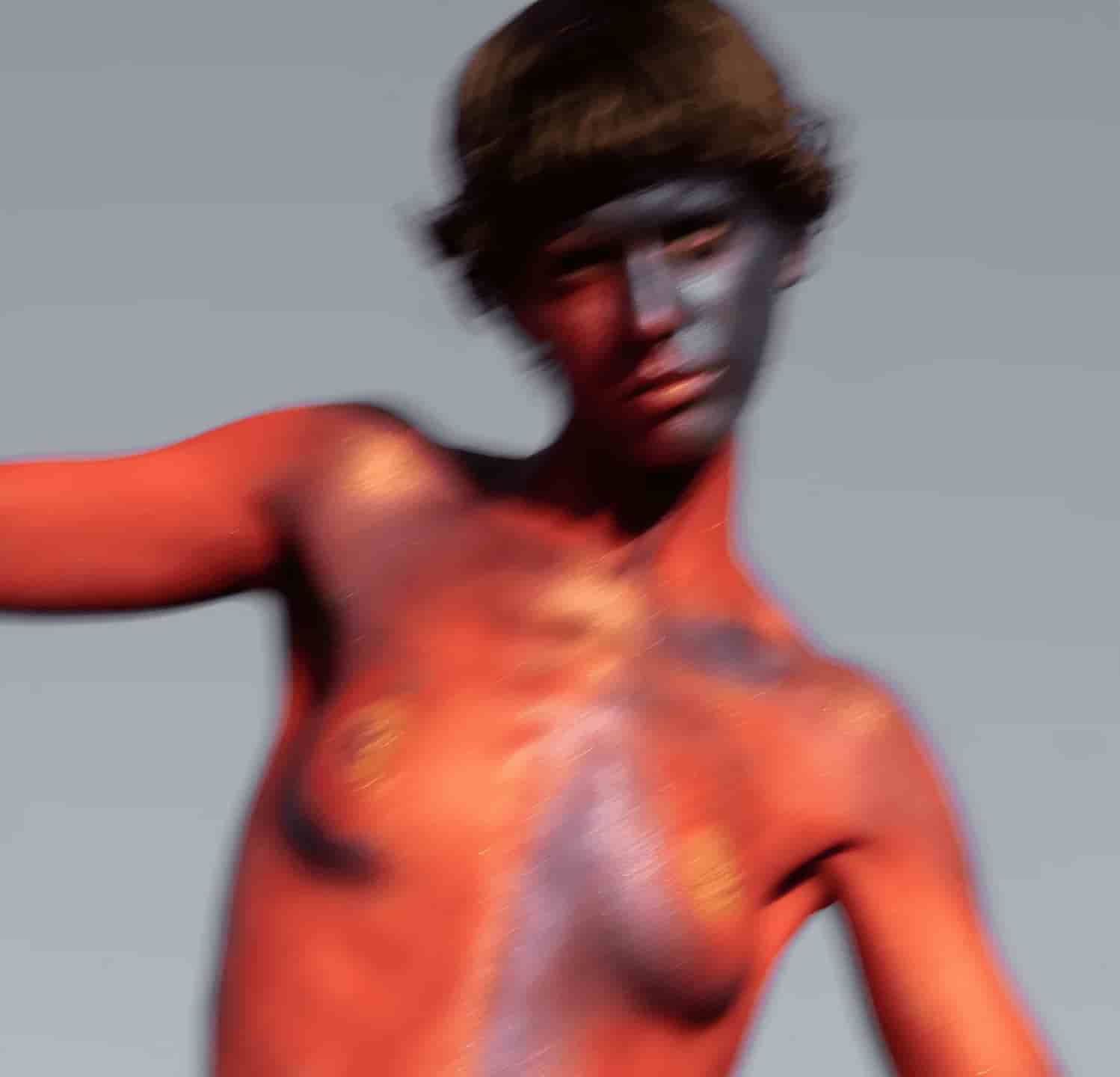
Text by
Kaden Mason
Photography by
Mika Kailes
Posted
March 30, 2024
Photography by Mika Kailes.
Make-up is more than a beauty ritual; it’s a reclamation of identity, a rebellion against the predetermined, and a medium for expression.
In a world that is often preoccupied with conventional beauty standards, make-up has become more than just a tool for enhancing appearance—it has evolved into a form of rebellion, a medium for storytelling, and a catalyst for self-discovery. For 21-year-old make-up artist Sabu Suzuki, the transformative power of make-up transcends its surface-level appeal. Swedish-born and London-based, Suzuki’s artistry is bold, intentional, and disruptive, challenging societal norms and redefining what it means to be beautiful in an era of conformity.
Suzuki’s recent collaboration with photographer Mika Kailes is a testament to his unique approach to the craft. Together, they have created a series of striking images that capture the fluidity of identity and the interplay between light and texture. Each look tells a story that resonates on both a personal and universal level. For Sabu, make-up is not just about painting faces—it’s about bringing inner truths to life and celebrating individuality in its most unapologetic form.
But Sabu’s journey hasn’t been without challenges. From navigating a competitive industry to overcoming personal struggles, he has faced moments of doubt and uncertainty. Yet, through it all, he has remained steadfast in his belief that make-up is a powerful medium of expression. “Make-up,” he says, “is not about hiding who you are—it’s about revealing who you want to be.”
As we sit down for this conversation, Sabu reflects on his beginnings, inspirations, and the philosophies that drive his work. With a laugh as vibrant as his creations, he welcomes us into his world—a space where art meets identity, and where every brushstroke is an act of self-empowerment.

Photography by Mika Kailes.
Kaden: Can you recall the first time you did someone’s make-up? What was the experience like?
Sabu Suzuki: Oh, absolutely! It’s seared into my memory—partly because it was such a disaster but also because it was a pivotal moment for me. I remember using this drugstore foundation that was completely the wrong shade and piling it on like I was frosting a cake. The end result wasn’t pretty, but there was something magical about the process. It was the first time I felt the thrill of transforming someone’s appearance, even if I didn’t quite know what I was doing. I think those early attempts are crucial—they teach you to embrace imperfection and to keep experimenting until you find your voice. Looking back, I realize that the heart of what I do now was already there in those clumsy moments: the desire to tell a story and create something meaningful.
Kaden: Why do you believe make-up is important in today’s world? It feels like people have very polarized opinions about it.
Sabu Suzuki: That’s such a loaded question, but I love it because it gets to the heart of why I do what I do. Make-up is important because it’s one of the few art forms that’s accessible to almost everyone. You don’t need a gallery or a platform to make an impact—you just need a face and some imagination. At the same time, it’s also a deeply personal thing. For some, it’s a way to express joy or creativity; for others, it’s a shield or a source of confidence. What’s fascinating to me is how polarizing it can be. Some people see it as empowering, while others see it as superficial. I think both perspectives miss the point. Make-up isn’t about vanity or conformity—it’s about choice. It’s about taking control of how you present yourself to the world, and in that sense, it’s incredibly powerful.

Photography by Mika Kailes.
Kaden: When did you know that make-up was going to be more than just a hobby for you?
Sabu Suzuki: That realization hit me like a ton of bricks during one of the hardest periods of my life. I was going through a lot emotionally and felt completely disconnected from myself. One day, almost on a whim, I started playing with make-up. It wasn’t for a job or a look—I was just painting my face to see if I could create something that felt alive. That process became my therapy. It helped me reconnect with parts of myself that I thought were lost. Over time, I started to see make-up not just as a coping mechanism but as a calling. It became clear to me that this was what I was meant to do—not just for myself but for others, too.
Kaden: How do you view make-up as an art form? A lot of people still see it as something trivial or surface-level.
Sabu Suzuki: I completely disagree with that mindset. Make-up is one of the most dynamic art forms because it’s alive. Think about it: you’re working on a canvas that breathes, emotes, and changes with every passing moment. That’s what makes it so exciting—and also so challenging. You’re not just creating something to look at; you’re creating something that interacts with the world. For me, make-up is about transformation, not just in a physical sense but on an emotional and spiritual level, too. It’s about taking what’s inside and bringing it to the surface in a way that feels authentic and powerful.

Photography by Mika Kailes.
Kaden: Your work feels deeply personal. How do you navigate creating something that resonates with your own story but also connects with others?
Sabu Suzuki: That’s a balance I’m always trying to strike. My work is undeniably rooted in my personal experiences—my struggles, my identity, and even my joys. But what I’ve learned is that the more specific you get, the more universal it becomes. People see their own stories in your honesty. When I create a look, I’m not just thinking about what it means to me; I’m thinking about how someone else might interpret it. It’s like planting a seed and letting others grow their own meaning from it. That’s the beauty of art—it becomes a shared experience.
Kaden: Have you ever felt pressure to conform to certain beauty trends or standards, especially in the industry?
Sabu Suzuki: Oh, absolutely. The beauty industry is full of unspoken rules and trends that you’re “supposed” to follow. But honestly, I’ve never been interested in playing by those rules. Early in my career, I felt that pressure to create looks that were “trendy” or “marketable,” but it didn’t feel authentic to me. I realized I’d rather be known for doing something unique—even if it’s polarizing—than for creating work that looks like everyone else’s. The way I see it, trends come and go, but authenticity lasts forever.
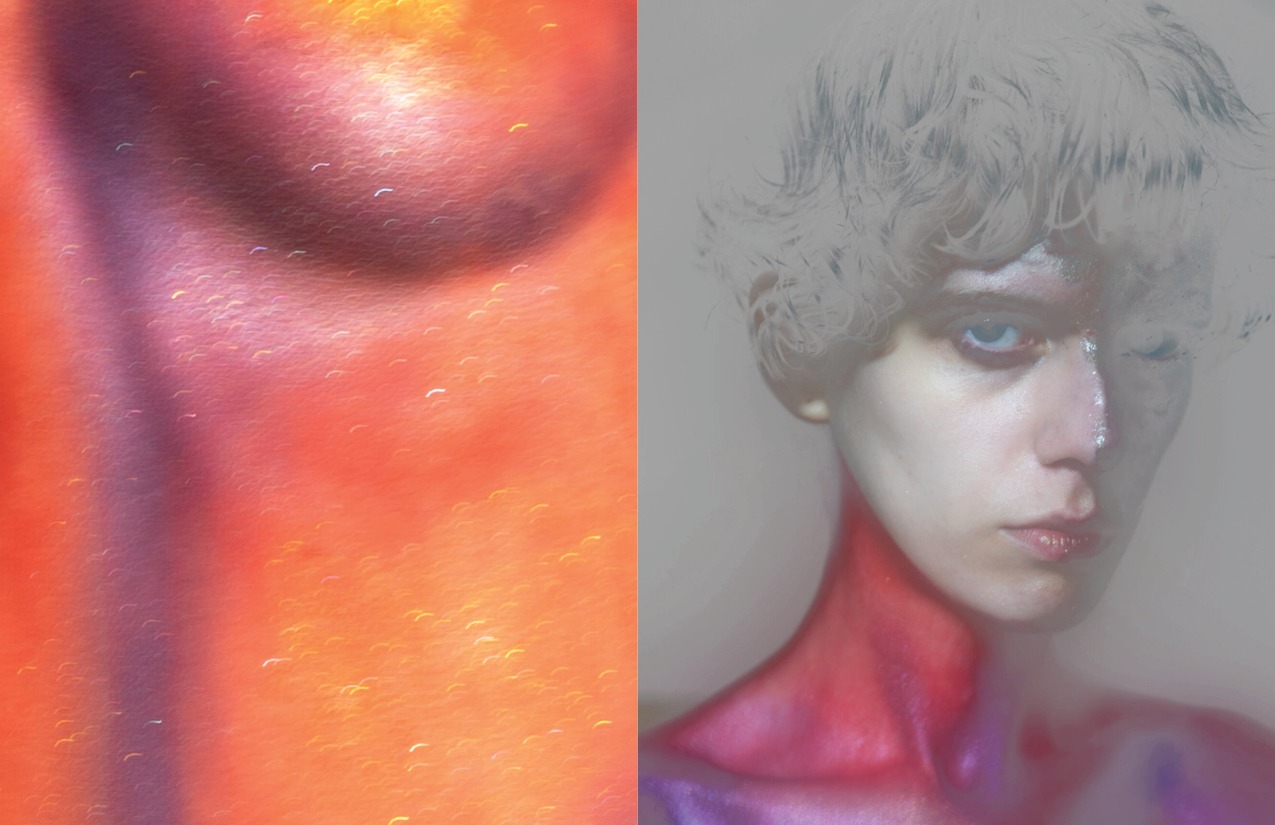
Photography by Mika Kailes.
Kaden: What inspires you when you’re working on a new look or concept? Do you draw from specific sources?
Sabu Suzuki: Inspiration is everywhere if you’re open to it. I get ideas from the most random things—like the way light hits a cracked mirror or the texture of peeling paint on a wall. Music plays a huge role, too. Sometimes a single song can inspire an entire look. And of course, people inspire me—how they move, how they express themselves, how they carry their stories in their faces. I think the most exciting part of being an artist is that you never run out of things to be inspired by. The world is a giant mood board if you pay attention.
Kaden: What advice would you give to someone who’s just starting out as a make-up artist but feels overwhelmed by the competition?
Sabu Suzuki: First of all, it’s okay to feel overwhelmed—that’s normal. But don’t let it paralyze you. The best advice I can give is to focus on finding your own voice. It’s tempting to look at what others are doing and try to emulate that, but the only way to stand out is to be true to yourself. Experiment, make mistakes, and don’t be afraid to create something that feels “wrong” by industry standards. Some of the most groundbreaking work comes from people who dared to do things differently. And remember, your journey is yours alone—don’t compare your chapter one to someone else’s chapter ten.
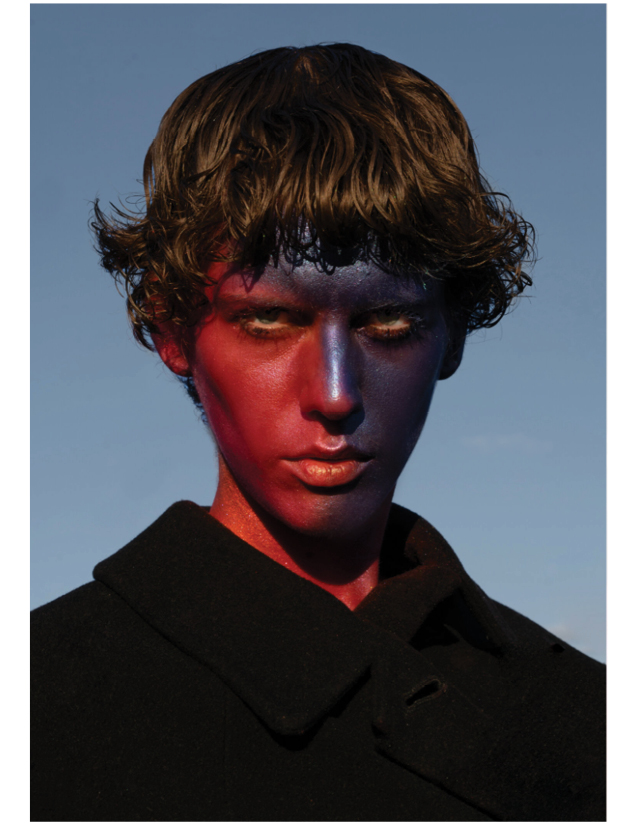
Photography by Mika Kailes.
As our conversation winds down, it’s clear that Sabu Suzuki is not just a make-up artist—he’s a visionary. His work challenges conventional ideas about beauty, art, and identity, inviting us to see make-up as a tool for empowerment and self-expression. Through his bold creations, he encourages us to embrace imperfection and celebrate individuality.
Sabu’s journey is a reminder that art can emerge from the most unexpected places. Whether it’s inspired by a moment of personal struggle or the mundane patterns of everyday life, his work proves that beauty is everywhere if you’re willing to look for it. His collaboration with Mika Kailes is a shining example of how make-up can transcend its traditional boundaries, becoming a medium for storytelling and connection.
But perhaps the most profound takeaway from Sabu’s story is his unwavering belief in the power of choice. “Make-up,” he says, “is not about conforming to someone else’s standards. It’s about creating your own rules and living by them. It’s about taking control of your narrative and saying, ‘This is who I am.’”
Text by
Kaden Mason
Posted
March 30, 2024
Text by
Kaden Mason
Photography by
Mika Kailes
March 25, 2025
Related
by Kelly Barnes
by DREEDN
by Andrekka Lanier


